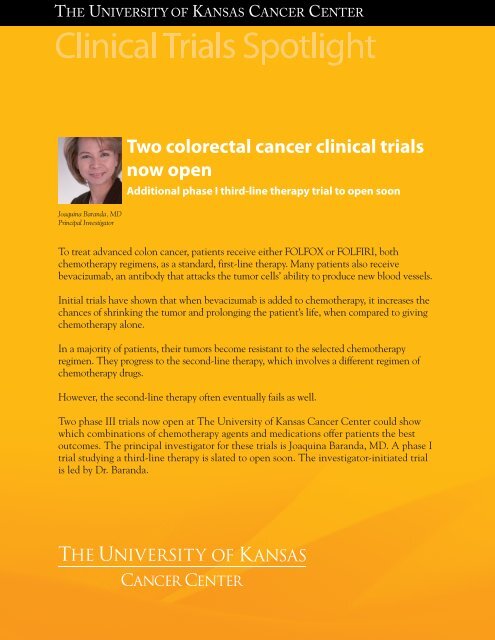Colorectal Cancer Clinical Trials Spotlight - The University Of ...
Colorectal Cancer Clinical Trials Spotlight - The University Of ...
Colorectal Cancer Clinical Trials Spotlight - The University Of ...
You also want an ePaper? Increase the reach of your titles
YUMPU automatically turns print PDFs into web optimized ePapers that Google loves.
THE UNIVERSITY OF KANSAS CANCER CENTER<br />
Two colorectal cancer clinical trials<br />
now open<br />
Additional phase I third-line therapy trial to open soon<br />
Joaquina Baranda, MD<br />
Principal Investigator<br />
To treat advanced colon cancer, patients receive either FOLFOX or FOLFIRI, both<br />
chemotherapy regimens, as a standard, first-line therapy. Many patients also receive<br />
bevacizumab, an antibody that attacks the tumor cells’ ability to produce new blood vessels.<br />
Initial trials have shown that when bevacizumab is added to chemotherapy, it increases the<br />
chances of shrinking the tumor and prolonging the patient’s life, when compared to giving<br />
chemotherapy alone.<br />
In a majority of patients, their tumors become resistant to the selected chemotherapy<br />
regimen. <strong>The</strong>y progress to the second-line therapy, which involves a different regimen of<br />
chemotherapy drugs.<br />
However, the second-line therapy often eventually fails as well.<br />
Two phase III trials now open at <strong>The</strong> <strong>University</strong> of Kansas <strong>Cancer</strong> Center could show<br />
which combinations of chemotherapy agents and medications offer patients the best<br />
outcomes. <strong>The</strong> principal investigator for these trials is Joaquina Baranda, MD. A phase I<br />
trial studying a third-line therapy is slated to open soon. <strong>The</strong> investigator-initiated trial<br />
is led by Dr. Baranda.
For Physicians and Health Care Professionals<br />
CLINICAL TRIALS SPOTLIGHT<br />
Combinations of chemotherapy agents and<br />
medications to be studied to determine efficacy<br />
for colorectal cancer patients<br />
Phase III clinical trial:<br />
Phase III Trial of Irinotecan/5-<br />
FU/Leucovorin or Oxaliplatin/5-<br />
FU/Leucovorin with Bevacizumab, or<br />
Cetuximab (C225) for Patients with<br />
Untreated Metastatic Adenocarcinoma<br />
of the Colon or Rectum<br />
This randomized phase III trial is<br />
studying cetuximab and/or bevacizumab<br />
when given together with combination<br />
chemotherapy. <strong>The</strong> trial’s primary<br />
purpose is to compare how well the<br />
chemotherapy agents work in treating<br />
patients with metastatic colorectal<br />
cancer.<br />
Eligibility<br />
Both men and women older than<br />
18 who have a histologically<br />
or cytologically confirmed<br />
adenocarcinoma of the colon or<br />
rectum. Patients with resected primary<br />
tumors who have documented<br />
metastases are eligible. Patients<br />
must have a wild-type KRAS gene<br />
determined by the SWOG Solid<br />
Tumor Repository laboratory or by<br />
a local CLIA-certified laboratory.<br />
Patients with a mutation in the K-ras<br />
gene are not eligible.<br />
Phase III clinical trial:<br />
Phase III Trial of Irinotecan-Based<br />
Chemotherapy Plus Cetuximab<br />
(NSC-714682) With or Without<br />
Bevacizumab (NSC-704965) as<br />
Second-Line <strong>The</strong>rapy for Patients<br />
With Metastatic <strong>Colorectal</strong><br />
<strong>Cancer</strong> Who Have Progressed on<br />
Bevacizumab with either FOLFOX,<br />
OPTIMOX or XELOX<br />
This randomized phase III trial studies<br />
irinotecan and cetuximab, combined<br />
with bevacizumab, to see how well it<br />
works compared with giving irinotecan<br />
and cetuximab alone in treating<br />
patients with metastatic colorectal<br />
cancer that progressed during first-line<br />
therapy.<br />
Eligibility<br />
Both men and women older than<br />
18 who have a histologically or<br />
cytologically confirmed colorectal<br />
cancer, meeting the following criteria:<br />
• Metastatic disease (confirmation<br />
may be from either the primary<br />
tumor or a metastasis)<br />
• Progressed on first-line therapy<br />
comprising bevacizumab and<br />
FOLFOX, OPTIMOX, or XELOX<br />
• Wild-type KRAS gene<br />
To refer a patient or consult with a specialist, call<br />
913.588.5862 or 877.588.5862.<br />
Visit kucancercenter.org/colontrial for more information.<br />
Dr. Baranda discusses these colorectal cancer trials in<br />
more detail. (video)<br />
Phase I clinical trial:<br />
Phase I Trial of Irinotecan and<br />
BKM120 in Previously Treated<br />
Advanced <strong>Colorectal</strong> <strong>Cancer</strong><br />
A third trial, scheduled to open soon,<br />
is designed to test the new drug<br />
BKM120. <strong>The</strong> goal of the trial is to help<br />
researchers learn whether BKM120<br />
could have an impact on both the<br />
KRAS wild-type KRAS or KRAS<br />
mutant types of colon cancers, when<br />
combined with irinotecan. This is an<br />
investigator-initiated trial led by Dr.<br />
Baranda.<br />
This phase I trial combines irinotecan<br />
and BKM120 in patients with advanced<br />
colorectal cancer who have failed on or<br />
have become intolerant of at least one<br />
line of therapy for advanced colorectal<br />
cancer and who are candidates for<br />
irinotecan therapy. This trial is designed<br />
to identify a maximum tolerated dose<br />
for irinotecan and BKM120 used in<br />
combination in the treatment of<br />
advanced colorectal cancer.<br />
Eligibility<br />
Both men and women older than 18<br />
who have histologically or cytologically<br />
confirmed metastatic or unresectable<br />
adenocarcinoma of the colon or rectum.<br />
Patients who have advanced colorectal<br />
cancer who have become resistant<br />
or intolerant of at least one line of<br />
chemotherapy regimen are eligible in<br />
this trial. <strong>The</strong>y must also meet the<br />
following criteria:<br />
• Patients must have adequate liver,<br />
renal and marrow function.<br />
• At least 28 days must have elapsed<br />
since the last dose of most recent<br />
regimen of chemotherapy and<br />
biologic agents used.
















